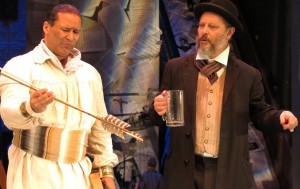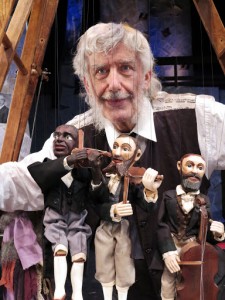In standing publicly and personally for the contribution of black spirituals and melodies to the future of American music, 19th-century European composer Antonín Dvorák took up arms against a sea of racism that did not subside with the ending of the Civil War. The New World Symphony: Dvorák in America, produced by the storied Czechoslovak-American Marionette Theatre, uses the little-known visit of the composer to our shores only 27 years after the Civil War to take a bold, bracing and exuberant swipe at American racism of the past and its echoes up through our current presidential elections. The production, which combines puppets with human actors, is nothing if not wildly imaginative and, at the same time, deeply serious and grounded in the historical record of Dvorák’s sojourn in the United States. Written and brilliantly directed by Vit Horejs, it is playing at the La Mama Experimental Theatre Club.
From 1893-95 the unassuming, prolific and famous Dvorák was the director of the National Conservatory of Music of America, based in New York, a brainchild of the philanthropist Jeanette Meyers Thurber. A woman far ahead of her time, Thurber sought out musical talent among “female, minority, and physically disabled” students, and in 1893—at the height of Jim Crow and of lynchings across the South—she and Dvorák initiated a tuition-free policy for black students. It was during his residency as director of the school that Dvorák composed arguably his finest and most beloved work, the New World Symphony. Among other pieces written in his “American” period, it was music influenced by the “Negro melodies” Dvorák so deeply admired.
At one point Dvorák remarks that “the future music of this country … must be founded upon what are called the Negro melodies. This must be the real foundation of any serious and original school of composition to be developed in the United States.” The statement, like many of the lines in the play, is drawn verbatim from writings by and interviews of Dvorák and contemporaries. While Dvorák’s prescient vision of the development of an American musical idiom within a deeply hostile and racist context is the overpowering theme of the play, the lively portrait of the period, wrapped, as it were, in the candy of broken violin parts, puppets, and theatrical slapstick, includes Prohibition, labor unrest, Tammany Hall, the Haymarket Riots and, importantly, the Columbian World Exposition, held in Chicago in 1893, in which the black Paul Lawrence Dunbar makes his appearance.
Horejs’s production includes both period and modern costumes at the same time that a fair number of lines of its text also wander from their strict historical period, as when Nazi Reichsminister Josef Goebbels says: “If by jazz we mean Judeo-Negroid music that is based on rhythm and entirely ignores melody, why then we can only keep the lower race responsible….” Another voice later declares, “I am now calling for a total and complete shutdown of Muslims entering the United States.” The connections between racism old and new, and, in fact, Old World and New World, could not be clearer.
In the play, as in life, we see Dvorák take black and Native American talent under his wing: Harry Burleigh and Will Marion Cook, black musicians and teachers who would deeply influence their students and the development of black musical forms, are two who appear in the play. Chief Big Moon from the Hunkpapa Tribe is another student of Dvorák who impressively lectures on arcane language issues on stage. The play ends with music that sweeps from gospel to jazz and to rock. Surely Dvorák’s prognostications about the black musical genius and its centrality for American music proved accurate.
As a composer known for bringing folk themes from his native Bohemia into his music, Dvorák would surely have been pleased to have his life rendered in the theater tradition of puppetry so dear to the hearts of Czechs. Ben Watts made for a Dvorák of boundless energy and verve. The rest of the cast was terrific.
In organizing the script in Dvorák’s actual footsteps rather than around a conflict or obstacle faced by the composer, Horejs perhaps sacrifices dramatic power for his historical purpose. No matter. The fun and slapstick of the production itself, its underlying serious ideas, and the concert quality of the music made up for any weaknesses. James Brandon Lewis on sax, Luke Stewart on bass and Warren Trae Crudup III on drums were simply outstanding. Harlem Lafayette, who played the black musician Harry Burleigh, has the voice of an angel, as does Valois Mickies who played a black female singer. Original music not composed by Dvorák, was composed by James Brandon Lewis.
The Czechoslovak-American Marionette Theatre production of The New World Symphony: Dvorák in America runs through March 27 at the La Mama Experimental Theater Club, 66 East 4th St. Evening performances are at 7 p.m. Thursday through Saturday; matinees are Sundays at 4 p.m. Tickets are $25. Seniors and students are $20. Ten $10 tickets are available for every performance on a first-come, first -served basis. For tickets, call the box office at 646-430-5374 or visit www.czechmarionettes.org.



